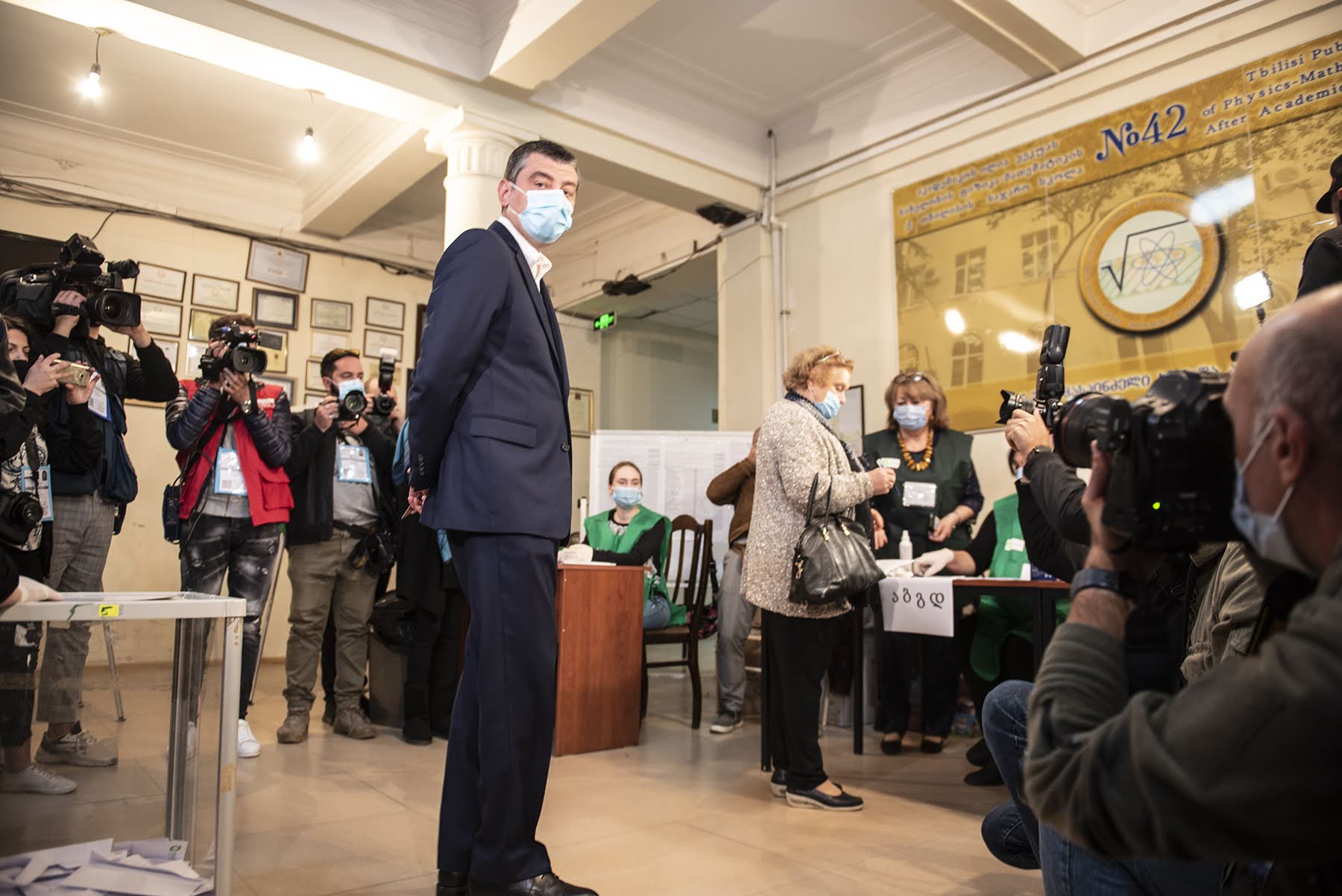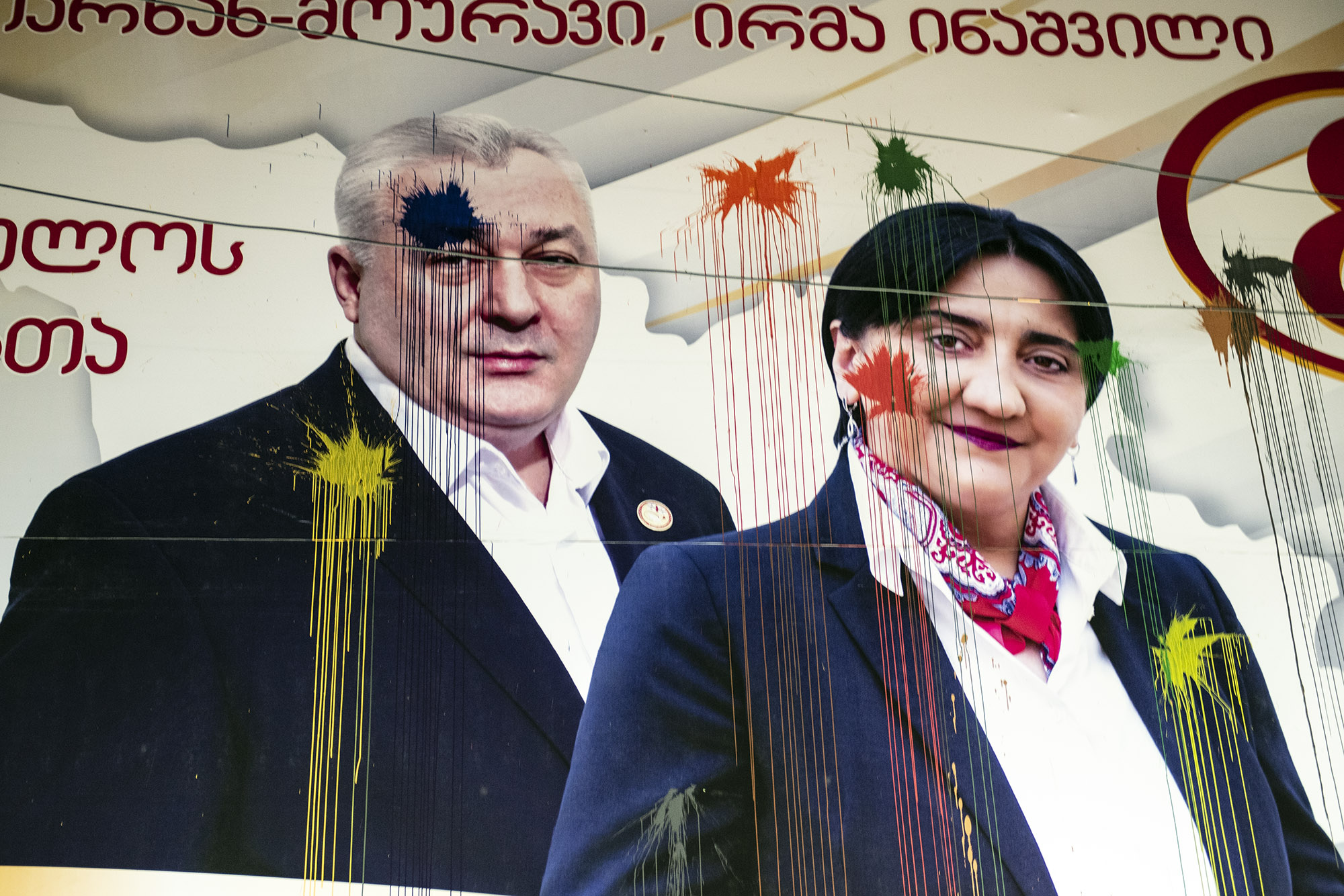Continuous protests break out over ‘rigged elections’ in Georgia

Before the united anti-government demonstration slated for Sunday, Georgia’s opposition have set their sights on electoral commissions throughout the country — submitting formal complaints and staging protests outside commission offices.
Georgian opposition groups and their supporters have stepped up their efforts to pressure the country’s election administration to address election violations and challenge a vote which they claim was ‘rigged’.
Police have even arrested several opposition protests including presumptive members of parliament — who were then released due to parliamentary immunity — following scuffles outside the district election commissions (DECs) in Tbilisi, Batumi, Kutaisi, and other cities in the past week.
With all votes counted, the preliminary official results gave parliamentary representation to seven political parties and two coalition blocs after passing a 1% threshold.
All of them, but the victorious Georgian Dream, vowed on 2 November to boycott parliament and took their grievances this week to the Central Election Commission (CEC) office in Tbilisi as well as to individual District Electoral Commissions in major Georgian cities. In addition to submitting legal complaints, they also staged demonstrations outside of the CEC and DEC buildings.
While some complaints submitted pertained to ballot-box stuffing and carousel voting, the opposition groups mostly had issues over imbalances between the votes cast and those counted, something confirmed by a number of local independent watchdog groups.
[Read more on OC Media: Georgian opposition pledges unity in boycotting new parliament]
According to the preliminary official results, the ruling Georgian Dream party has won at least 74 seats in the parliament, 2 mandates short of a majority. However, the opposition’s boycott of parliament and demand for new elections throw the outcome into uncertainty.
‘Technical errors’ and a plot for ‘revolution’
Both the CEC as well as the members of Georgian Dream have attributed the faulty electoral summary protocols to human error resulting from the poor staff training. They criticised the post-election street protests as undue pressure on the country’s electoral authorities.
Meanwhile, opposition groups have claimed their representatives were frequently blocked from entering DECs sessions that dealt with complaints and that in many cases, the complaints were rejected summarily, without a proper hearing.
On 5 November, the local rights groups Georgian Young Lawyers’ Association and Transparency International — Georgia, who had also submitted complaints to DECs confirmed that most of their requests for vote recounts were rejected.
On Thursday, General Secretary of Georgian Dream Kakha Kaladze claimed that as the result of recounts at 11 polling stations in Georgia it was ‘confirmed’ that there were ‘only technical errors’, not electoral fraud.
Kaladze, as well as other Georgian Dream officials, have accused ex-President Mikheil Saakashvili and his UNM party of planning to come to power through ‘violence’ and ‘revolution’ instead of winning in the election.
The claim has also been taken up by Georgia’s State Security Service which opened an investigation based on a statement made by Georgian Dream’s Irakli Kobakhidze on 30 October in which he claimed that prominent UNM members had organised armed groups in the run-up to the election.
Upcoming rallies amid surging COVID-19 cases
On 6 November, Sergi Kapanadze, an MP from the European Georgia party, accused the authorities of manipulating COVID-19 case numbers to institute strict restrictions and prevent opposition groups from holding a rally on 8 November. Earlier that morning, the medical authorities reported a record-breaking 2,775 daily cases of the virus.

Before Kapanadze’s statement, Georgian Public Defender Nino Lomjaria appealed to the CEC to address all reported violations in a ‘timely’ manner, something which would, according to her, defuse tension and put a damper on the protests.
Lomjaria also urged the opposition groups to consider the ‘grave epidemiological situation’ by ‘closely implementing’ all preventive measures against the spread of COVID-19.
Coalition blocs Strategy Aghmashenebeli and the UNM-dominated Strength in Unity, as well as the Labour, Girchi, Lelo, and Citizens parties are getting ready for a big rally in Tbilisi slated for 8 November. On the following day, the conservative opposition Alliance of Patriots (APG) party plans to hold a separate demonstration in the western Georgian city of Kutaisi.
A common pledge to boycott the new parliament on Monday was the rare occasion when the APG joined other opposition parties in a united political move.
The Alliance of Patriots, an anti-liberal party that held 6 seats in the outgoing parliament and is now slated to have 4 seats, had carved their political identity out by contributing to the downfall of UNM rule in 2012.

Since then, their strong position against the return of UNM to power earned them the label of being Georgian Dream’s ‘satellite’. They have also been called ‘pro-Russia’ for their anti-NATO platform.
On 5 November, the APG announced they would hold their protest in Kutaisi instead of Tbilisi as they had previously planned in order to underline they acted ‘independently’ of UNM and the country’s liberal opposition.









